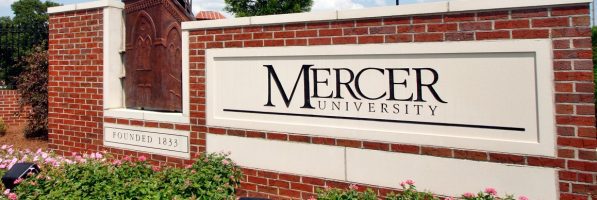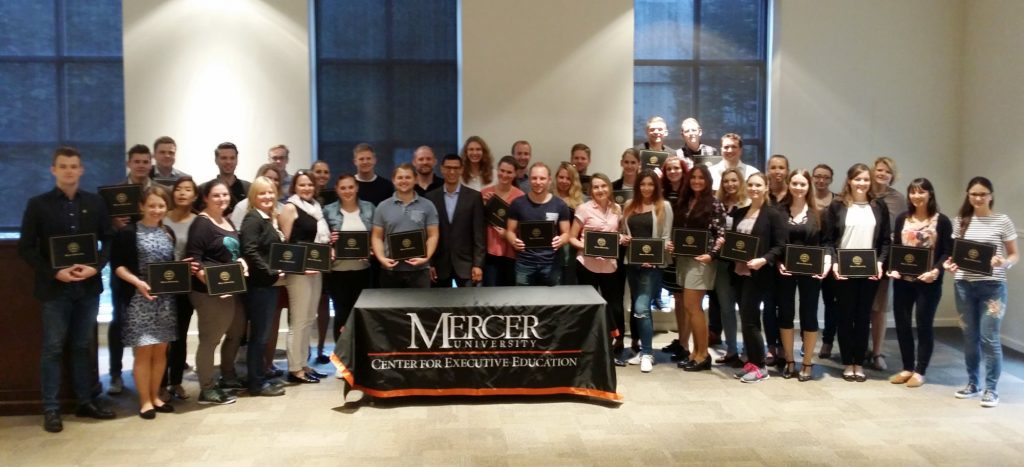CO.STARTERS at Mercer University Shaping New Community of Entrepreneurs

The Mercer University Eugene W. Stetson School of Business & Economics recently launched CO.STARTERS, a new business development program providing the resources and connections necessary for the Middle Georgia community to turn ideas into action.
Since October, CO.STARTERS has been helping small-business owners to develop their businesses by building and testing simple models that receive feedback in real-time. CO.STARTERS is a nine-week long, cohort-based program that also uses community support to help in the process of business leaders developing their models. Instead of approaching startups like large corporations, the programs model encourages the testing of small models before diving into creating a broad model of business. Registration is open to the public and includes a fee of $199.
Although the relationship between CO.STARTERS and the Mercer Innovation Center is fairly new, the CO.STARTERS program has already had a global impact, serving communities throughout the United States, and even all the way to New Zealand and Australia.
“We are excited to be adding CO.STARTERS to the Mercer Innovation Center program offerings,” MIC deputy director Stephanie Howard said. “This hands-on program will be an asset to the entrepreneurship ecosystem in the Macon-Bibb community.”
Enoch Elwell, CO.STARTERS founder, commented how many communities across the country are overlooked as business centers but often have a wide range of talented entrepreneurs. These communities need extra support for entrepreneurs to provide them with the tools and resources to thrive.
“CO.STARTERS provides a structure for these communities to achieve their economic growth goals and gives them an easy way to build the connections they are already trying to grow,” Elwell says.
Tuition Cost vs. Starting Salary: Atlanta

One of the most important things a prospective MBA can look for when choosing a business school is the program’s return on investment. Return on investment, or ROI, is the most common profitability ratio, and an easy way to determine if an MBA is “worth” your time and money.
According to a recent review of 129 schools from U.S. News & World Report, graduates from a third of the institutions earned an average starting salary and bonus of more than $100,000, with the overall average for all schools coming in at $91,940. MBA Class of 2015 graduates typically left school with just over $50,054 in debt, according to the same data.
Most business schools publish employment records with average salaries for different industries, so prospective MBA students can use these numbers to project future salaries. Lucky for you, we’ve compiled these figures some of the Atlanta metro‘s premiere business schools.
The Atlanta MBA Return on Investment
Clark Atlanta University School of Business
A full-time MBA at the Clark Atlanta School of Business requires 60 credit hours of study, which totals up to $53,220 in tuition. Other costs also apply, including $1,008 in annual fees as well as books and supplies. To save some money for sibling students, Clark offers a Sibling Discount to a biological or legally adopted sibling currently enrolled at Clark Atlanta University. Siblings will receive a 33.3 percent discount after submitting a copy of both birth certificates, parent’s federal tax return and a simple application.
According to employment statistics provided by the school, MBA graduates earn an average base salary of $79,000 with a signing bonus of $12,250. Most graduates took marketing/sales jobs (59.7 percent), with finance/accounting (29.7 percent), human resources (7.4 percent), and operations (7.4 percent) following behind. In order to help place MBAs, the Atlanta University Center Consortium Career Planning and Placement Service (AUCC CPPS) offers students career planning and placement resources, plans on-campus recruiting events and hosts a database of contact information for over 1400 corporate, government and educational partners. They also host several on-campus recruiting sessions and career fairs.
Eugene W. Stetson School of Business & Economics – Mercer University
Full-time MBAs at Mercer’s Eugene W. Stetson School of Business & Economics pay $818 per credit hour, with total tuition for the program coming to $29,448 with some additional minimal costs, such as a technology fee. Students can visit the university’s Office of Student Financial Planning to receive updated financial assistance information, including information on federal student loan programs.
According to U.S. News, Mercer MBAs earn an average base salary of $57,500, with 23.8 percent of full-time graduates employed at the time of graduation. Mercer students can visit the Office of Career Management Services on the Macon or Atlanta Campus to receive specialized career guidance, job search, internship search, résumé and cover letter assistance, developing personal brand information, interviewing information, and salary negotiating.
Goizueta Business School – Emory University
Students enrolled in Emory University’s Goizueta Business School two-year, full-time MBA program pay a base tuition of $59,000 per year, while those enrolled in the one-year program pay about $89,500. These cost account for tuition only, so students must consider additional expenses for textbooks and other fees. To offset some of these costs, financial assistance is available in the form of Federal Stafford Loans, graduate plus loans, private loans, international student loans, research and assistantships, merit-based scholarships, fellowships from the Goizueta Business Fund for Excellence and fellowships at various constituent centers.
According to Goizueta’s most recent MBA employment report, the school’s alumni are among the top for post-graduate employment nationwide, with nearly 95 percent of students receiving job offers within three months after graduating and an average full-time base salary of $113,295. Goizueta Business School’s Career Management Center (CMC) offers assistance to full-time MBAs in their job search. Students can receive professional development and interview training within both core and elective courses, preparing students for both the internship and job search processes. Most Emory MBAs were offered post-graduate employment following an internship (56 percent), with another 19 percent getting job offers thanks to School Scheduled Interviews.
YOU MAY ALSO LIKE: How To Avoid Costly MBA Résumé Mistakes
Scheller College of Business – Georgia Institute of Technology
Tuition costs for Georgia Tech Scheller College of Business full-time MBA students are about $29,232 a year for Georgia residents or $40,180 a year for out-of-state residents, as well as $2,010 in mandatory fees. Financial assistance is available in the form of federal loans, graduate assistantships, and a limited number of fellowships.
According to the school’s MBA Compensation Overview, 95 percent of Scheller MBAs are employed within three months of graduation. These students are paid an average starting salary of $108,088. Meanwhile, 90 percent of graduates earn a signing bonus, which average to the amount of $15,830. Scheller MBA students are guided along the path to employment at the Jones MBA Career Center, where they learn about opportunities for internships and employment through one-on-one advisement, an eight-week career development workshop, self-assessment tools, interview preparation, and a series of conferences and career fairs
Terry College of Business – University of Georgia
Terrt’s in-state students pay about $15,670 in annual tuition, including student fees, for the Terry College of Business‘ full-time MBA. Non-residents pay $34,378 per year, including student fees. The school also awards approximately one-third of its students with graduate assistantships to help make the program even more affordable. Some students may have their tuition drastically reduced per semester, get 40 percent of their student health insurance premiums paid by UGS, and receive a monthly stipend for working 13 hours per week in the Terry College of Business. Additional scholarships are also available, such as the Terry MBA Leadership Scholarship. Given out during the spring semester, the scholarship awards between $1,000 to $2,000 to a student who has shown promising leadership skills.
According to the school’s MBA Employment Statistics, 90 percent of University of Georgia full-time MBA students receive a job offer within three months of graduating with an averaging starting salary near $90,250. Terry helps its students gain employment at the MBA Career Management Center (CMC), which helps students and graduates connect with networking events, information sessions, interviews, and much more.
German Graduate Students Head to Mercer Business

For the first half of October, the Mercer University Eugene W. Stetson School of Business & Economics hosted 40 FOM Hochshule students from Essen, Germany. The select students participated in a series of workshops, seminars, and more.
With their participation in the Oct. 2-13 program, the German students earned Lean Six Sigma Green Belt certifications as well as university credits. Along with the aforementioned workshops and seminars, students in the two-week program also visited the Atlanta Tech Village—a massive co-op hub (the fourth biggest in the U.S.) that houses companies such as SalesLoft and Namely, as well as the city’s chamber of commerce—and the SweetWater Brewery.

Forty students gather from the FOM Hochshule, the university of applied sciences in Essen, Germany/via Mercer
On the international program, Dr. Markus H. Dahm from FOM Hochshule, says (translated), “The combination of Lean Management and Six Sigma enables organizations to increase their productivity, achieve higher quality, and remain competitive in the long term. This basic course offers an ideal introduction to the topic.”
In a recent press release, Dr. Eric Kushins, Assistant Professor of Entrepreneurship and Director of Executive Programs at Stetson said, “The Center for Executive Education would like to thank Dean Susan P. Gilbert for helping to establish this relationship and for providing support for this program. The training would not have been so well received without the excellent teaching from Dr. Myriam Quispe-Agnoli, Dr. Beth Chapman, Dr. Nik Volkov, and Joseph Briner.”
“And a special thanks to Dr. Michael Weber and Dr. Julie Petherbridge for teaching and assisting with the logistics and organization,” he also added.
Click here to read more about the two-week stay and what you need to know to earn a Lean Six Sigma Green Belt certification.
Your Search for Atlanta’s Best Accelerated MBA Programs

Most folks pursuing an accelerated MBA know which industry or area of concentration they want to pursue. They are MBA candidates who want to advance their current careers, not switch them. Others choose the accelerated route because it can be difficult to leave two years of work and salary. Continue reading…
Mercer Innovation Center Announces New Class of Fellows

The Mercer Innovation Center (MIC) at the Mercer University – Eugene W. Stetson School of Business & Economics recently announced plans to support four new business fellows and five companies-in-residence.
Stetson Boren Scholarship Helps Make International Impact

Maggie Callahan, a senior at the Mercer University Eugene W. Stetson School of Business & Economics, was recently awarded the a Boren Scholarship to travel to Tblisi in the Republic of Georgia to study the region’s political culture for the 2017-18 school year.
